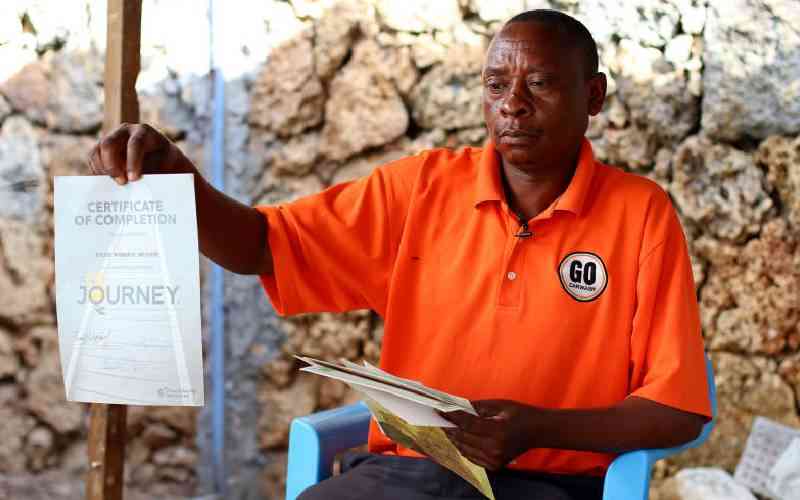Kenya: Injections are painful. But if your life depends on them, you wear a brave sleeve like 14-year-old Sydney Murimi has done, bearing two injections daily to stabilise his blood sugar.
He has diabetes type 1 and the pain notwithstanding, he has to inject himself daily, at 6am and 6pm to manage the condition.
However, advanced hormone research has sweet news for patients like Sydney following the approval of a new form of insulin that can be inhaled and has shown the promise of acting faster to manage blood sugar.
Patients will only be required to take a ‘puff’ through a hand-held inhaler shaped like a whistle instead of the traditional ‘shot’ from a needle-prick before or after each meal.
Afrezza, manufactured by an American biotech company MannKind Coorp, comes in a powder administered via a whistle-sized inhaler called the Dreamboat and upon inhalation; the insulin goes into the lungs and gets into in the bloodstream to start working between 12 to 15 minutes, and is out of the system within an hour.
Sydney hopes it will not be long before he graduates to the new form of insulin given the inconvenience and pain that comes with daily injections.
“There is pain when I inject myself but since my life is dependent on insulin, perseverance is important,” said Sydney in an interview.
He doesn’t wince as he injects himself, but he hopes to smile with the advent of this new drug approved last month to manage diabetes globally.
Consultant Physician Wafula Nalwa termed the approval of Afrezza by the US Food and Drug Administration a breakthrough that will benefit about 1.6 million people living with diabetes in Kenya.
“Mealtime sugar is often a challenge in patients not reaching fasting sugar targets yet overall control is not attained.” said Dr Nalwa who is also the Migori County and Referral hospital director.
He says many people with diabetes will find it less painful and more comfortable to inhale than inject before meals, which is an indication of better control of diabetes.
The physician adds that despite the pain, the injection is also accompanied by fear of getting scars especially girls and young people have issues conforming to strict adherence especially in front of peers thus feeling different and disadvantaged when they inject themselves.
What is diabetes?
Diabetes is a chronic disease that occurs either when the pancreas does not produce enough insulin (type 1) or when the body cannot effectively use the insulin it produces, (type 2) and in both types the glucose level in the blood remains too high.
Stay informed. Subscribe to our newsletter
Insulin is a hormone that regulates blood sugar.
Type 1 diabetes means complete dependency on insulin to control the level of glucose every day, an art and science that this Standard Eight pupil has acquired.
“I divide my stomach area into three sections and inject the measured amount under my skin at least one centimeter away from the previous site I had injected to reduce the swelling,” explains Sydney.
Needle pricks are routine of most diabetics and the new discovery will give them a lifeline. The cost of insulin in Kenya ranges with some organisations providing subsidised insulin while others give free of charge, and some patients purchase it from pharmacies.
Nalwa notes that the cost of insulin varies with the type and delivery technique with premixed insulin packaged in vials and administered twice a day by a syringe, available in Government hospitals at a cost of Sh500 for the insulin and syringes.
“More sophisticated insulin that require pens or pumps for administration and are preferred for their flexibility and better control range anywhere between Sh7,500 to Sh200,000 ,” he says.
Globally, health experts are concerned about the shift from active to dormant lifestyles which has seen the increase of lifestyle diseases like diabetes with Africa’s ailing healthcare systems urged to improve treatment and educate rapidly urbanising populations about the causes and dangers of the condition.
Sydney’s mother, Alice Njeru, says they took him for diabetes tests following complaints about frequent thirst and urination given that her grandmother is also diabetic.
“I was shocked when the blood sugar tests showed he was diabetic and would require insulin injections every day for the rest of his life to manage the condition,” said Ms Njeru in an interview.
Challenged
She says diabetes has long been associated with the elderly and her son’s diagnosis challenged her to debunk the myth.
Njeru explains that after knowing her son’s condition, the family made a deliberate decision to be eating from the same pot than prepare separate meals.
“My husband and I offer support by eating the same meal Sydney does to promote healthy living that we all need to embrace,” says Njeru of their only child.
Kenya Diabetes Management and Diabetes Centre executive director Eva Muchemi hailed the approval of the inhalable insulin saying it would ease management of diabetes, if the cost will not be prohibitive.
“This new form of insulin will assist more patients and especially those who fear injections including children who have no option in insulin use every day,” Mrs Muchemi told The Standard on Saturday.
She further expressed concern over the rising numbers of youth below 18 years especially those with type 2 diabetes in Kenya due to the shift of lifestyles from active to dormant ones with a focus on refined foods and little exercise.
The drug was approved for diabetes type 1 and 2 use in adults before meals and for children from the age of 11. Medicine qualifies patients like Sydney to be considered as adults when dosages are prescribed.
According to the researchers, patients will have less weight issues because this form of insulin stays in the body for a short time compared to the less acting forms of insulin that take 20 minutes to kick-in, peak at two to three hours and stay in the body for as long as five hours.
Watches his diet
Sydney also watches his diet especially at parties to ensure the blood sugar doesn’t get too high or become severely dehydrated which can lead to a diabetic coma.
“Diabetes has changed what I eat but not the interaction with my friends because I also go for parties, youth camps and field trips where I have learnt that observing my glucose levels is very important,” he says.
A diabetic coma is a medical condition where a patient loses his/her consciousness due to imbalance in blood sugar levels.
A patient suffering from very low blood sugar (known as severe hypoglycemia) or very high blood sugar (hyperglycemia) can slip into diabetic coma.
Afrezza is not the first inhaled insulin to be introduced in the market. Another product produced in September 2007 was withdrawn following high cases of lung cancer among diabetes patients.
However, manufacturers indicate that patients would have to wait a little longer for the product to be ready in America in about six months.
The drug does not require refrigeration thus Sydney hopes that he can carry it when he joins his dream institution, Mang’u High School, because it will save him the inconvenience of carrying the injectable insulin in its charcoal cooler.
Those with diabetes and have asthma have been advised against using Afrezza with the common adverse reactions associated in clinical trials showing low blood sugar levels, cough, and throat pain or irritation.
Nalwa called for the availability of more convenient forms of insulin especially for young diabetics like Sydney given that childhood is a time of rapid growth and organ maturation, which sometimes comes with insulin resistance.
 The Standard Group Plc is a
multi-media organization with investments in media platforms spanning newspaper
print operations, television, radio broadcasting, digital and online services. The
Standard Group is recognized as a leading multi-media house in Kenya with a key
influence in matters of national and international interest.
The Standard Group Plc is a
multi-media organization with investments in media platforms spanning newspaper
print operations, television, radio broadcasting, digital and online services. The
Standard Group is recognized as a leading multi-media house in Kenya with a key
influence in matters of national and international interest.
 The Standard Group Plc is a
multi-media organization with investments in media platforms spanning newspaper
print operations, television, radio broadcasting, digital and online services. The
Standard Group is recognized as a leading multi-media house in Kenya with a key
influence in matters of national and international interest.
The Standard Group Plc is a
multi-media organization with investments in media platforms spanning newspaper
print operations, television, radio broadcasting, digital and online services. The
Standard Group is recognized as a leading multi-media house in Kenya with a key
influence in matters of national and international interest.









